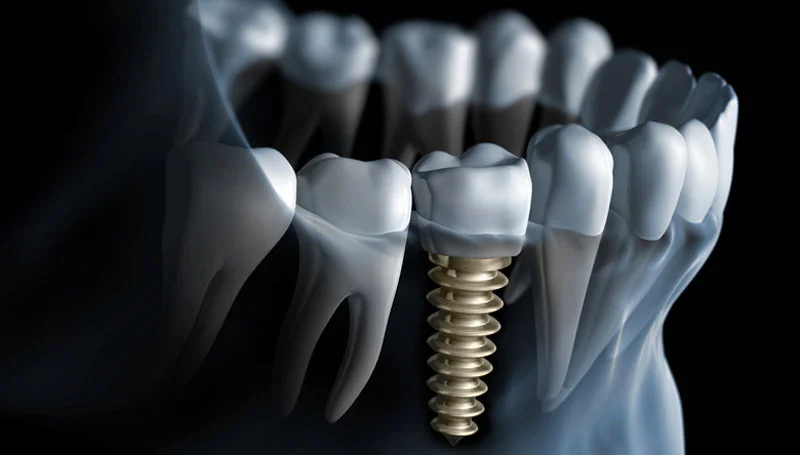What is an implant?
Implants are manufactured “anchors” that resemble cylinders or screws. Used in upper and lower jaws, they are surgically inserted into the jawbone to become a stable base for artificial replacement teeth.
The implant itself acts as the root of the tooth. The structure placed over the implant will look and perform like the natural tooth that was lost.
How do implants differ from dentures?
 Unlike dentures, implants are not removed for overnight soaking and cleaning, need no adhesives and do not require anchoring to healthy teeth.
Unlike dentures, implants are not removed for overnight soaking and cleaning, need no adhesives and do not require anchoring to healthy teeth.
How are implants placed?
Implant surgery is a three-step process, performed in a dentist’s office:
-
First, a dentist surgically places an implant directly into the jawbone, positioned like a natural tooth root. The implant will usually remain covered for three to six months to allow bone to develop around the implant to help hold it in place.
-
Once bone has developed, the dentist uncovers the implant and attaches an extension, called a post. The surrounding gum tissue then needs to heal – a process that typically takes several more months.
-
Once healing is complete, the implant is ready to serve as a foundation for the new tooth. The dentist makes a crown (or other artificial tooth replacement) and attaches it to the implant post.
The entire process can take five to nine months to complete, depending on the patient’s situation and speed of healing. Dentists typically give specific instructions on how to care for dental implants. It is important that you follow these instructions carefully.
How effective are implants?
The best candidates for implants are those in good general health who have healthy gums and sufficient bone structure. Depending on their location in the mouth, implants are usually between 80 and 95% successful.
Implants may be less successful for people who smoke, grind or clench teeth or have a history of radiation therapy. Patients with diabetes or osteoporosis who have bone loss in the jaw may also be at risk for complications. Check with your dentist to see if implants are the right choice for you.
When implants fail, it is usually because of:
-
Poor oral hygiene, resulting in infection or impaired healing
-
Overloading, or too much pressure on the implant structure (this usually happens when you grind your teeth, which can cause the implant to move)

